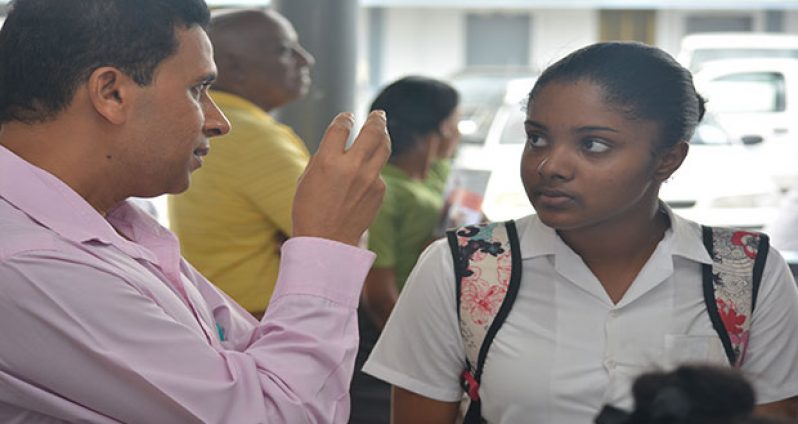THE Ministry of Health on Wednesday observed World Cancer Day in the capital city with a Health Fair in its compound at Lot 1 Brickdam.
Held under the theme: “Preventing and Curing Cancer is not Beyond Us,” the exhibition was well received and attracted hundreds from nearby schools, workplaces and members of the public at large.
Apart from cancer-related booths, several other booths were set up to provide health services to visiting persons. Persons were therefore able to access blood pressure readings, random blood-sugar tests; dental care; advice on tobacco smoking – which is one of the leading causes of cancer – and Visual Inspection with Acid (VIA) screening, among other things – all free of charge.
The Food Policy Division of the Ministry of Health also held demonstrations, offering food- based dietary guidelines, as well as exhibits of what constitute healthy eating. The exhibits also highlighted the nutrition-related risk factors of breast cancer and how some foods contribute to cancer. There was also distribution of pamphlets and other education materials on the various non-communicable diseases.
Focal Point for Adolescent Health, Dr. Ertenisa Hamilton also conducted highly interactive health education sessions for students of secondary schools who showed keen interest in the discussions.
‘WHAT IS CANCER’
Meanwhile, Head of the Cancer Institute in Guyana, Dr. Rabindranauth briefed participants on ‘What is Cancer’- its origin; how it is caused; the various types of cancer; and how they manifest themselves in a person’s body. He also exposed viewers to techniques on cancer detection such as pap smear; VIA, mammogram and ultra sound, whilst urging women and young girls to get screened early for cancer. Screening for a disease means getting one’s self a medical check-up before the disease presents itself.
For breast cancer, screening is done either through a mammogram or breast ultra-sound and that procedure is referred to as a sono-mammogram, the oncologist said. He said that while cancer can strike at an earlier age, a breast mammogram should be done for all women over 40 years. After 40 the breast mammogram is mandatory and should be done every year.
In the case of uterine cancer, a pap smear is recommended. But more recently visual inspection, using acetic acid has been promoted by the Ministry of Health and has proven very effective. The Ministry continues to urge women to make use of this service which is provided at local health centres.
Noting that many women are reluctant to get screened for breast and cervical cancer, Dr. Rabindranauth said that invariably, when they do get screened, they are presented with stage 3 breast cancer. Unless a person is screened and the cancer detected, the person cannot be treated. “A simple mammogram and breast ultrasound could detect breast cancer at a stage where it is completely treatable and curable and people live their full life as cancer survivors,” Dr. Rabindranauth, advised.
He also touched on cancers in the male, highlighting colon cancer, prostate cancer and lung cancer, the latter, though found predominantly in men, develops in women also.
FEW SURVIVORS
Emphasising the need for early screening, detection and treatment of cancer, Dr. Rabindranauth, who addressed students of the University of Guyana on Cancers, on Breast Cancer Awareness Day (October 2014), made the point that the Cancer Institute of Guyana gets only few cancer survivors.
And just why: [They come so late that] “When they reach us they are paralysed; they come with bone fractures which means they are at stage 4 and the cancer has gone to the bone, fracturing the bone. It has gone to the liver and manifests as jaundice. Or perhaps they come with swollen abdomen. This is not at the stage where we can do anything. At that stage we just give some hormones and repaliation – meaning prolongation of the life, reduction of pain. We don’t want to do that. We want every one of us go get medical checkup for breast cancer,” he affirmed.
Ending on the note that “Preventing and Curing Cancer is not Beyond Us, Dr. Rabindranauth stressed that: “Early screening for cancer can save lives.”
(By Shirley Thomas)



.jpg)








